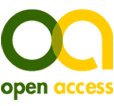Open Access
Free worldwide access to scientific knowledge (open access) is essential to lastingly safeguard and pass on accumulated knowledge and cultural heritage while setting aside economic interests.
For many years, research institutions, scientists, and libraries have demanded that publishers' pricing strategies be challenged and recommend open, public access to publicly funded research results. This position is underlined in the so-called Berlin Declaration.
Be part of it! Publish Open Access!
The Road to Open Access
Fundamentally, there are two strictly different roads one can follow: the golden road and the green road. In the section below, we will explain the recommended procedure for publishing in both variations.
You want to know more about licensing? Read our section on Copyright and consult our license models. Further information on open access licenses can be found at Creative Commons.
Golden road
This road leads to the primary publication of an article in an open access journal. Publication in an open access journal can be - but not necessarily is - free of charge. This form of publication is often associated with the "auther pays" business model: author-financed free access for all.
Usually, authors are permitted to deposit their work in an institutional repository, and they should take advantage of this opportunity. It serves first and foremost the long-term protection of intellectual material in case an open access publisher ceases to exist and thereby terminates access to purely online published material.
Recommended procedure:
- You should check which open access, peer-reviewed journals would be appropriate for your manuscript as well as, where applicable, the cost of publication. The Directory of Open Access Journals (DOAJ) could be of help to you.
- Submit your manuscript to the journal. To defray open access publication expenses use our publication-fund. Your journal ist not listed? Check the quality of your desired journal at the quality open access market (QOAM).
- Once your manuscript has been accepted, you should additionally submit a postprint to the institutional repository OPARU, under the condition that you have authorization from the publisher.
Green road
Publishers often allow author self-archiving and parallel publishing in institutional or subject-based repositories, respectively. In this case, the institution provides the necessary infrastructure (e.g. staff, computers, etc.).
Normally, material is first published in a toll-access, peer-reviewed journal.
The first publication of the article is generally only available via pay-per-view or through a paid subscription, whereas on the parallel publication site, the article is available in full text or for free.
Recommended procedure:
- Find out if the publisher of your choice will allow you to deposit your publication in an institutional repository. More and more publishers are allowing this, mostly, though, only if certain requirements are met (e.g. embargo period, copyright notice, etc.). The following databases will provide guidance with this step:
- Sherpa RoMEO
A summary of major publisher OA policies. - Sherpa Juliet
A summary of foundation OA policies.
- Sherpa RoMEO
- Submit your manuscript to the journal.
- After your manuscript has been accepted, make sure that in the contract you retain the right to self-archive your material in an institutional repository. This is, of course, only necessary if the publisher does not automatically give you the right to place your work in a repository.
- In consideration of the publisher's rules and regulations, submit a postprint to the institutional repository OPARU. To find subject-based repositories use the Directory of Open Access Repositories (openDOAR).
If you are not allowed to deposit a postprint on a full-text server, then you still have the option to deposit a preprint instead, followed later by a corrigendum. This does not constitute a copyright infringement.

